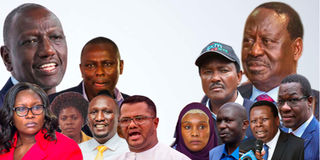Three Kenyans in court to stop Ruto, Raila talks at Bomas

President William Ruto (top left) and his Kenya Kwanza talks team and Azimio leader Raila Odinga (top right) and his team.
Three Kenyans have moved to court to stop the National Dialogue Committee from further sittings saying the lack of a legal framework to guide the collection of views from members of the public in an inclusive and participatory process, makes it illegal.
The three Kenyans argue that it is clear that the committee, jointly chaired by National Assembly majority leader Kimani Ichungwah and Wiper Party leader Kalonzo Musyoka, is operating unconstitutionally.
"The political elite seems to be using the committee for political self-dealing. It is imperative that the court stops the committee and guide the way forward- in terms of the mechanics," the petitioners stated through lawyer Peter Wanyama.
The petition by Issa Elanyi, Patrick Karani and Paul Kirui comes a day after four former commissioners of the electoral body testified before the committee and maintained their stance in disowning last year's presidential election.
The petitioners argue that the formation of the committee by Parliament without a legal framework to guide the process of the collection of views, remuneration and general guidelines on how to conduct civic education, and formulation of issues, debate on the issues by the members of the public, violated Article 10 of the Constitution on public participation.
The trio want the High Court to temporarily block the committee sittings, pending the determination of the petition.
Incurring public funds
"Pending the hearing and determination of this application inter parties, a conservatory order be issued stopping the Clerk of the Senate and Clerk of the National Assembly from incurring public funds to support an entity known as the National Dialogue Committee and its secretariat," the petition added.
They further argued that since the committee gave Kenyans only seven days to submit their views on constitutional amendments, it violated the constitution as one week was inadequate to allow for meaningful and qualitative engagements.
The petition also states that in an advertisement, the National Dialogue Committee isolated issues for amendment of the constitution “without involving the people’s constituent and sovereign power to decide for themselves the complete set of issues for amendment”.
"It is not clear how the issues were arrived at. Are they conclusive? Why pick issues that appear to safeguard the self-interest of the political elite?" the petitioners wondered, adding that the committee cannot "cherry-pick and lemon sale issues for constitutional amendment from the ivory towers of the Bomas of Kenya while sipping expensive champagne and tea".





